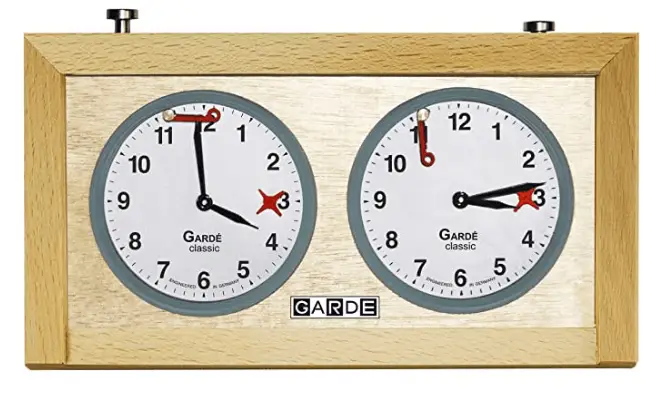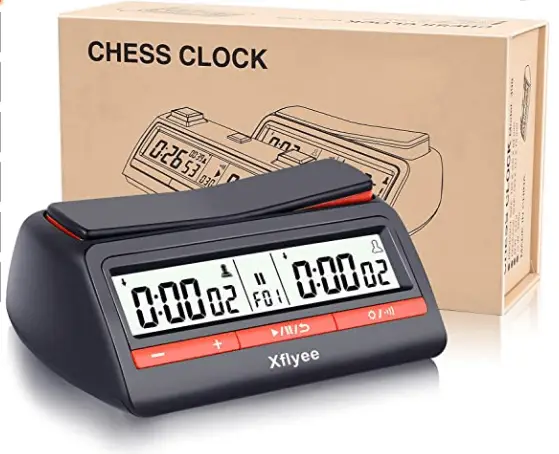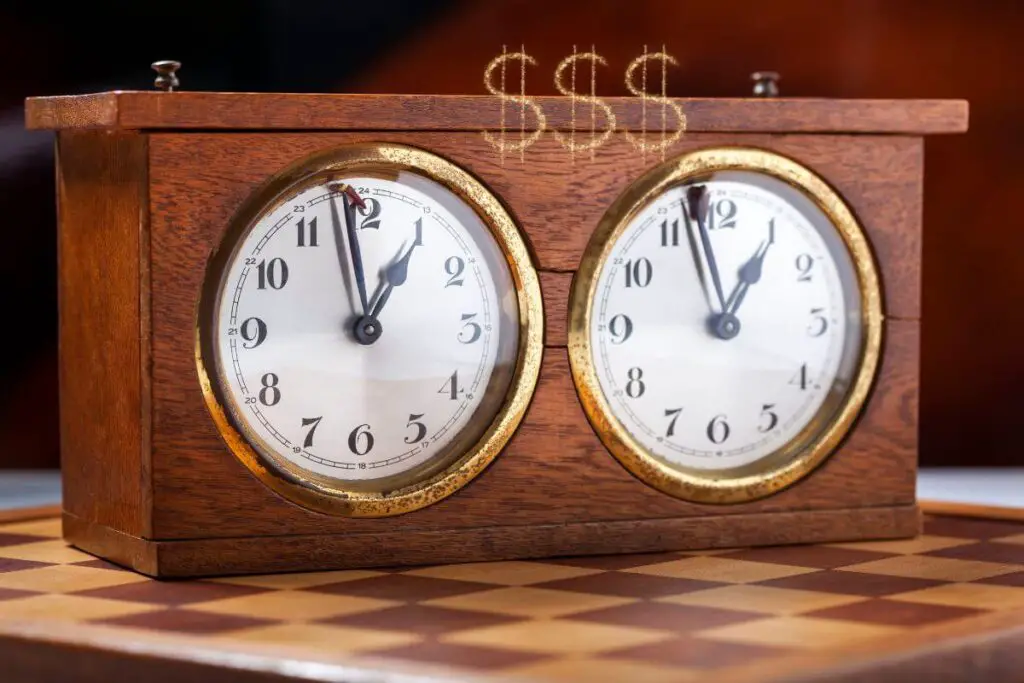Time management is one of the most essential skills to have under your belt while playing chess. Understandably, when you check the chess clock price ranges, you might be stunned.
Naturally, chess clock prices vary depending on brand and how many features they come with. Some can be rather budget-friendly and are no more than $10 or $20. Others, however, can reach as high a price as 500 dollars!
So, why can a timer be so expensive? And how do chess clocks add to your game?
If you’re avid about chess and are curious about how much chess clocks cost, we’re going to delve right into it.
Chess Clock Price: How Much It Costs
Chess clocks are essential tools for playing timed chess games. They consist of two timers that can be started and stopped independently, allowing each player to have a set amount of time to make their moves.
The cost of a chess clock varies depending on the type and brand. They range from as low as $10 to over $500. Digital chess clocks are typically priced between $10-$100 with most on the lower end, whereas a rare vintage analogue chess clock will typically cost around $200. However, you can still find some options that are below that budget.
So, what makes the difference? Why choose a $500 clock over a budget-friendly $10 one? Or your phone’s timer?
Keep on reading to learn the features and history of a chess clock.
What Affects Chess Clock Prices?
Let’s look at the features you can find on a chess clock which affect both its quality and price.
Analog and Digital
The most basic type of chess clock is the analog clock. They’re simple mechanical devices that operate with physical gears and springs to keep track of time.
Analog clocks are more affordable than digital ones, as their prices start at $10.
On the other hand, digital clocks operate with electronic components like LCD screens and batteries.
They’re the ones that come packed with features, which include different time controls and pre-set timing modes.
Moreover, digital clocks are more diverse in styles and sizes. That’s why they can start at around $30 and go up to $500!
Materials
The materials that go into the construction of the chess clock affect how high the price is. You can find wood, plastic, and metal clocks.
Each material differs in durability, with metal ones being the strongest. Still, you can find high-quality wood or plastic ones that are durable and have nice and stylish designs.
Modes
When you’re playing professionally, you’ll start wanting to invest in high-end digital models. This is mainly because they come with plenty of features that enhance the game’s quality.
Some of the most helpful ones include:
- A touch sensor
- Multiple present options: Increment or decrement settings, seconds added after moves, Fischer Mode, Blitz Mode, etc.
- More stylish designs and interactive screens/clock faces
Of course, the more bells and whistles on the clock, the higher its price will be.
Brand
Naturally, the brand of the chess clock you get will affect how affordable it is. Popular options include LEAP, DGT, Xflyee, ZMart, INSA, Chronos, and Garde.
Chess Clock History
The first time a chess clock was ever used in a chess tournament was in 1883 in London. It was used under Thomas Bright Wilson’s name, who played in the Manchester chess club.
Since then, we use chess clocks not only for chess, but also for shogi, go, scrabble, and many more two-player board games.
Chess clocks emerged because, back in the day, chess was a time-consuming commitment. A single game could last up to eight or even ten hours!
Sometimes, players would choose the strategy of exhausting their opponent. In 1843, a game between Pierre St. Amant and Howard Staunton lasted for over 14 hours!
So, as you can see, there had to be some kind of time constraint to regulate the game. A clock also makes chess more about tactical strategy rather than a cold war.
Where to Buy Chess Clocks?
You can find plenty of good chess clock options online, and here are a couple of solid options for you to check out.
1. DGT 3000 Chess Clock

This state-of-the-art clock is a real gem. The DGT 3000 comes with all the options that could make a chess clock valuable.
- Massive display that shows an incredible amount of information: How much time is remaining for each player, the setting you’re using, which player’s turn is it, and the period you’re in.
- Shows the seconds from the beginning of the countdown—and not only during the last minute.
- Comes with 25 pre-set modes and allows you to add five of your own.
- Can connect it to DGT electronic chess boards.
- Comes with a five-year warranty.
2. Garde Classic Mechanical Chess Clock

If you’re looking for an old-school look with an analog face, the Classic option from Garde is an excellent one.
Consider the Garde chess clock for a simple option without too many complex settings.
Although it can be deemed a little overpriced for what little features it has to offer, you’ll be paying for the stylish appearance. Plus, you can use it to decorate your library or study.
- Cedar wood design.
- Clock faces are 2.7 inches in size.
- Analog faces give it a rustic aesthetic.
- Engineered in Germany.
3. Xflyee Chess Clock

If you’re looking for a budget-friendly digital chess clock, the Xflyee is the ideal choice. At under $35, this chess clock has way more than it lets on.
- Equipped with eight functionalities: single and multi-segment, bonus, time delay, time limit, countdown, and setting memory.
- Comes with 32 timing rules whose parameters can be modified.
- Controls are intuitive and the interface is easy to navigate; 3-button control.
- High-quality ABS design makes it durable, sturdy, compact, and environmentally friendly.
Final Thoughts
Overall, it’s important to determine your level of experience in competitive gameplay when you’re choosing a chess clock.
Moreover, keep in mind the additional functions you’d like to have, either in analog clocks or digital ones.
Remember, the features make or break the chess clock, so make sure to choose wisely.


